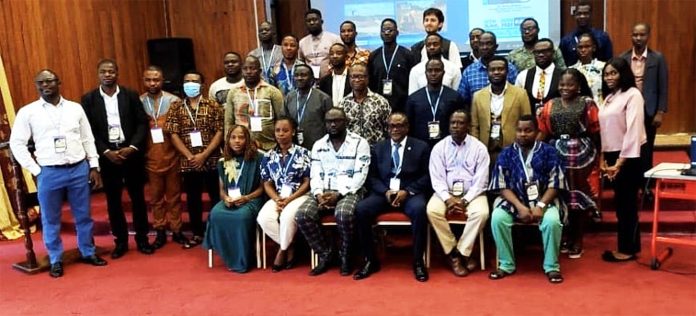Dr Jones Mantey, a chartered environmentalist in Ghana’s large-scale mining sector, has called for a national policy shift that incentivizes ecological restoration across the country’s mining landscape, with phytoremediation as a cornerstone strategy.
Speaking at the inaugural DAAD Alumni Conference on Mineral Mining in Ghana and Phytoremediation held at the CSIR-Soil Research Institute (CSIR-SRI) in Kumasi, Dr Mantey urged the government and regulatory agencies to enact and enforce robust green mining laws that particularly target the small-scale mining and galamsey sector.
“We need effective regulations that will guide mining companies, especially small-scale operators, to integrate phytoremediation into their environmental plans. Public-private partnerships are crucial. We must incentivize ecological restoration, support nature-based solutions and hold all stakeholders accountable.”
He explained that phytoremediation, a green technology gaining global traction, involves the use of specially selected plants to clean up environments contaminated by industrial activity, especially mining. According to him, this method is cost-effective, eco-friendly and particularly suited for post-mining landscapes in Ghana.
Dr. Mantey emphasized that phytoremediation is not a one-size-fits-all method, but rather a set of nature-based techniques, each with unique strengths depending on the type of pollutant and environmental condition.
He explained that phytoextraction uses specific plants to draw harmful metals and toxins from contaminated soils into their stems and leaves, which are later harvested and safely disposed off. Phytotransformation, on the other hand, allows plants to take up pollutants and chemically convert them into less harmful forms through internal metabolic processes ideal for breaking down organic toxins.
In areas where removing the contaminants could cause further damage, phytostabilization is used to immobilize pollutants in the soil, preventing them from leaching into water bodies.
Rhizodegradation involves plant roots supporting microbial communities that naturally break down organic compounds such as hydrocarbons. In aquatic environments, rhizofiltration allows plant roots to act as filters, absorbing or binding contaminants directly from polluted water sources.
He also highlighted mycoremediation, a technique that uses fungi, especially mushrooms, to break down complex pollutants, often working alongside plants to enhance environmental clean-up.
“These different methods show how powerful nature can be when guided by science. Each of them offers Ghana a practical tool for cleaning up the legacy of mining, if only we are willing to invest and enforce their use,” he said.
He disclosed that some large-scale mining companies in Ghana have already integrated phytoremediation into their mine closure and land reclamation strategies, especially in rehabilitating tailings storage facilities, landfill sites, and degraded farmlands.
He, however, expressed concern that many small-scale miners who dominate Ghana’s mining sector, fail to adopt such environmentally responsible practices, often leaving land severely degraded.
“We stand at a crucial crossroads, Phytoremediation is not just a scientific breakthrough; it is a commitment to responsible mining. By embracing nature-based solutions, we can restore ecosystems, protect communities, and ensure a sustainable future.”
As a case in point, Dr Mantey cited the experience of Amansie Resolute, a mining company that handed over its site to government after concluding operations. Despite the company’s compliance with closure protocols, illegal miners quickly moved in and ravaged the land, a result he attributed to the lack of community inclusion in the restoration process.
“Without community involvement, any attempt at ecological restoration risks failure and wasted resources,” he emphasized. To prevent such outcomes, Dr. Mantey called for the establishment of long-term environmental monitoring and tracking programmes to ensure restoration efforts are not only implemented but sustained. He also advocated for investment in data-driven environmental management systems and stronger advocacy for policy reforms. “Sometimes reclamation is done without proper follow-up. Monitoring is key,” he said.
CSIR-SRI Backs Scientific Innovation for Restoration
Opening the conference, Dr. Collins Tay, Director of the CSIR-Soil Research Institute, expressed optimism about the potential of phytoremediation to transform Ghana’s approach to environmental protection in mining. “This conference accomplishes our shared goals, it marks a significant step toward financing scientific innovation for sustainable mining and restoration.”
Dr. Tay commended the partnership between Ghanaian researchers and their German counterparts under the DAAD Alumni platform, stating that such collaboration strengthens the country’s capacity to apply scientific principles to environmental recovery.
According to him, phytoremediation represents a cost-effective and scalable scientific tool to rehabilitate degraded landscapes. He revealed that twelve sub-themes were developed from the conference’s core theme, with over 100 abstract submissions, attracting both DAAD alumni and new participants.
“We are particularly enthusiastic about the participation of young men and women, (scholars and non-scholars), students and industry professionals alike. Their energy proves that research and industry can intersect to produce meaningful solutions,” he said.
Environmental Advocate on Why Conversation Matters
In a media interview, Dr. Albert Kobina Mensah, an environmental advocate and the initiator of the conference, described his personal motivation for spotlighting phytoremediation.
“Environmental issues are dear to me, I realized that many Ghanaians don’t even know what phytoremediation is, so I created this platform for a national conversation.”
Dr. Mensah described the initiative as topical and timely, especially in the context of Ghana’s ongoing struggle with illegal small-scale mining (galamsey), which he warned has devastated vast tracts of land, sometimes beyond restoration.
He also raised alarm about chemical pollution in gold mining areas, particularly mercury and cyanide contamination of rivers and aquatic ecosystems.
He noted that even large-scale mining firms sometimes release toxic elements into the environment through collapsing tailings dams.
“There are documented cases of people consuming mercury-contaminated fish from polluted rivers. The health implications are deadly,” he stated.
Dr. Mensah emphasized that unless mining (both legal and illegal) is brought under strict regulation and guided by science, Ghana could face irreversible ecological collapse.
“If mining is done sustainably, the impacts are minimal. But if it’s done indiscriminately and unregulated, as in many small-scale operations, then Ghana is sitting on a time bomb,” he warned.
A Unified Call for Green Mining Policy
All three experts—Dr. Mantey, Dr. Tay, and Dr. Mensah—concluded with a unified message: Phytoremediation must become a mainstream requirement in Ghana’s mining regulations.
Sustainability is not a choice; it is a moral duty.”









